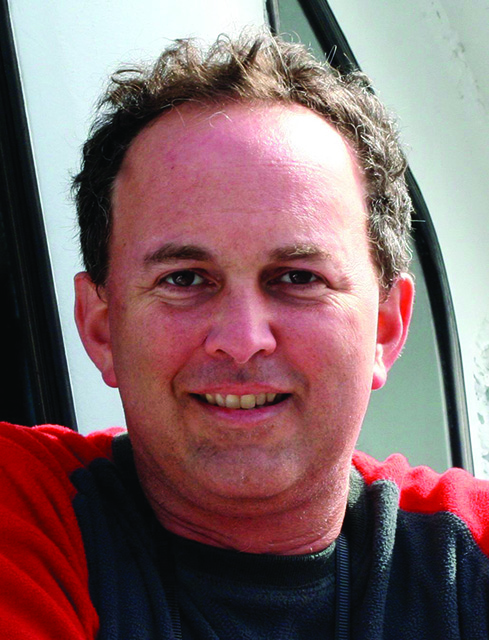Is There an Audience for a Jewish Network?
John Odoner, an attorney and TV neophyte, looks at the size of the
Jewish population and thinks that, in the world of niche networks that cable
has become, there's an audience waiting to be served.
He may soon find out. The founder and CEO of Jewish Television (JTV),
Odoner now hopes to launch his cable channel this September.
“There are 6.7 million Jewish Americans but 13.3 million who are a
quarter or half Jewish,” Odoner believes he can woo that “Jewish-plus”
crowd and reach a broader range of viewers.
Industry experts are more than a little skeptical of Odoner's chances.
Undaunted, he promises that his proposed channel “will have a
downtown, let-your-hair-down, crossover feel. Our mantra is: 'Not just news
and not just Jews.'”
Odoner is deliberately vague on many of his programming details as he
works to finalize rights deals.
He does plan on importing and dubbing some Israeli programming,
simulcasting John Batchelor's ABC Radio Network show (because it covers the
Middle East well), and featuring a music-video program, reality shows, movies
and comedies.
Broadcasting & Cable Newsletter
The smarter way to stay on top of broadcasting and cable industry. Sign up below
But while he is still considering some variations on initial concepts
like Jewishly Incorrect, a comedic political
commentary, and Nice Jewish Boyz, a
Man Show with a Jewish twist (which may
begin as skits in a larger format instead of as a stand-alone program), Odoner
has decided that not every program will be distinctively Jewish.
“There are so many directions we want to go,” he says, although he
acknowledges that diluting the original idea is a mistake of many cable
start-ups.
“The cable landscape is littered with failed networks that did not
establish and secure their base,” he says. “Rest assured that JTV will not
ignore its base.”
Tall hurdles ahead
Odoner is offering equity stakes to the cable operators and DBS
companies and is optimistic that a “realistic launch” this fall will put
JTV in 10 million to 12 million homes.
Elie Rosenfeld, COO of the Joseph Jacobs Organization, an advertising
and marketing agency specializing in Jewish consumers, says a network like
Odoner's could probably get some carriage in the major markets. “There is
certainly enough of a market to greatly increase the amount of Jewish-related
television, because it's a community that is underserved,” he says.
Others aren't so sure. “The barrier to entry is too high and the
size of the audience is too low,” says Jay Sanderson, CEO of the
not-for-profit Jewish Television Network (JTN), which began life in the 1980s
with plans to become a full-fledged network but instead morphed into a
production company. “There have been a hundred different people trying this
over the past 10 years,” he says.
Expanding a small base
Cathy Rasenberger, of Rasenberger Media, which helps launch start-up
networks, perceives Odonor's optimism as “naiveté,” especially in
such a “hostile environment” for any new network.
“Most entrepreneurs believe their idea is unusually superior to
others,” she says. “But there is no economic model for this. It's just
way too small a demographic to support a network. There's no way he'll
launch in that many homes.”
Sanderson's JTN programming includes HomeStyles(focused on celebrating Judaism at home),
magazine show Twenty 2 Forty, specials
centered on Jewish holy days and the upcoming four-hour, two-part documentary
The Jewish Americans. Most of these shows
run on public television. Says Sanderson, “We're showing our ability to
produce prime time big-event programs and get an audience for them.”
He is excited about broadening his network's audience while staying
true to the mission with the upcoming Exodus and
Freedom. The program shows the connection between the story of the
Exodus and modern survivors, including a former Sudanese slave, a man on death
row who was wrongfully accused and an army officer who survived the 9/11 attack
on the Pentagon.
He thinks some programs like New Jewish
Cuisine have broader commercial appeal, but negotiations with the
Food Network fell apart over ownership and rights issues.
He says JTN is discussing programming—including two reality series
“with very strong Jewish values”—with other commercial networks.
As a single show, maybe that's all right for JTN. But Rosenfeld thinks
Odoner's thoughts about making a “broad-based” JTV is the wrong idea.
“From an advertising perspective” he says, “I'd like to see something
that has more Jewish content.
“If viewers have to ask, What does that program have to do with
JTV?,” he continues, “then the network will flounder. Advertisers don't
need another general- interest cable network with a tiny audience, even if it
reaches upscale, urban demographics.” If it is that generic, he jokes, “you
could just do the American Express Channel, because it's the same
demographic.”
Rasenberger believes there may never be a big enough market for a
full-fledged network but there will be more opportunities as cable operators
develop a business model for video-on-demand.
On-Demand in the cards
Sanderson is looking at VOD as well. “There are still questions about
how it works and when we should enter the fray, but, yes, absolutely, we see
video-on-demand in the future.” In fact, it's Topic A at a March retreat
planned by the company.
The trick for Sanderson and any producer is to sell a religious program
to the masses as well as the core audience. Says Sanderson, “We think there
are important messages within Judaism that we want to share with Jews
and non-Jews.”
Stuart Miller has been writing about television for 30 years since he first joined Variety as a staff writer. He has written about television for The New York Times, The Washington Post, the Los Angeles Times, The Guardian, The Boston Globe, Newsweek, Vulture and numerous other publications.

